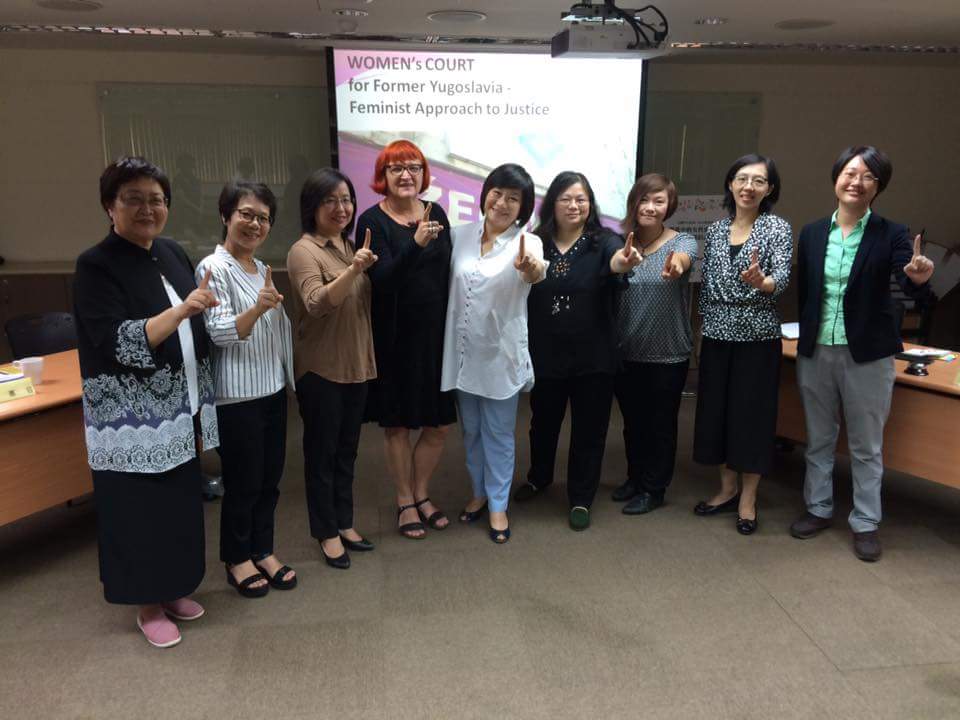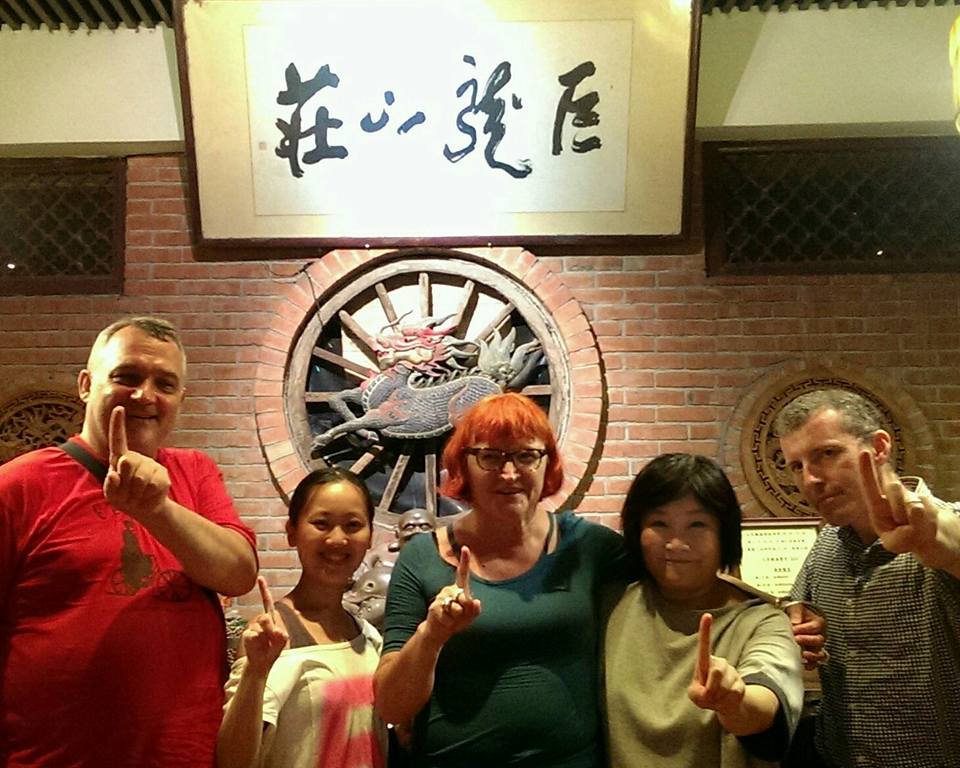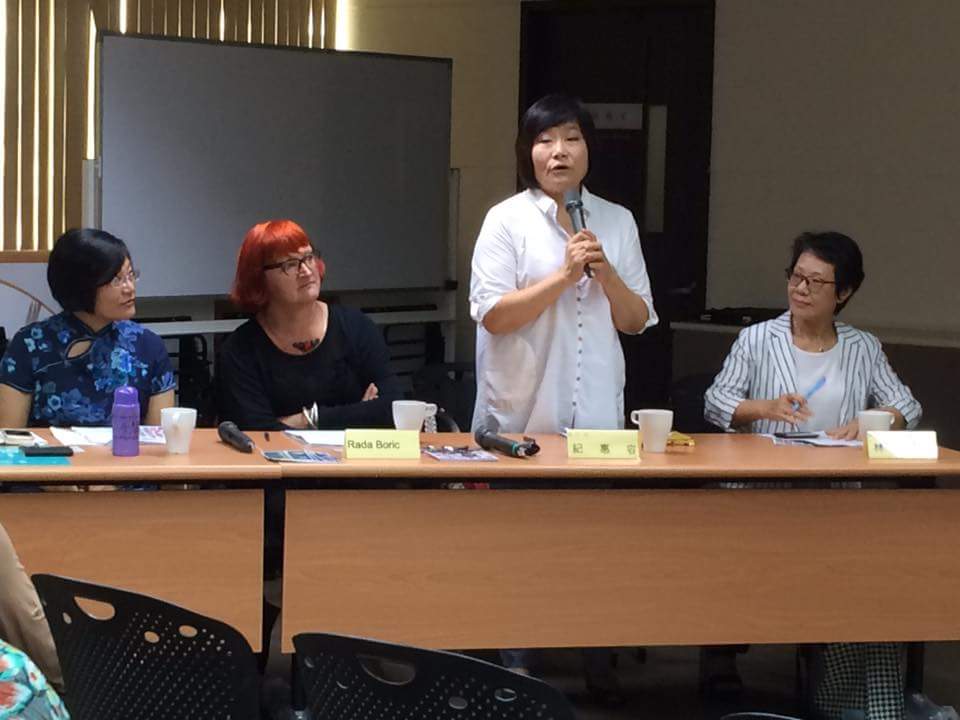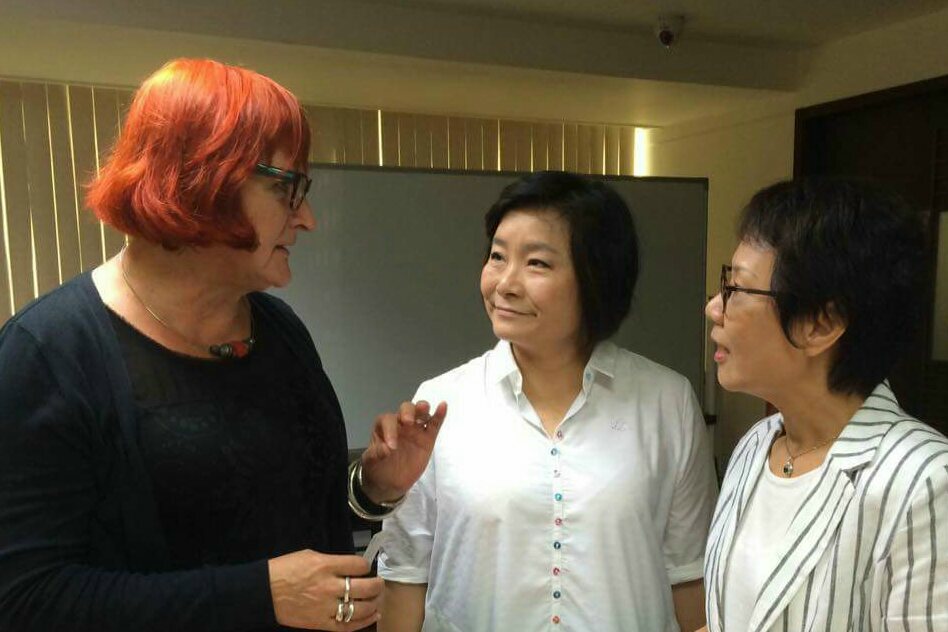
 (Taipei, August 12, 2016)
(Taipei, August 12, 2016)
Rada Boric speaks on “Women in War: The story of feminism in the Balkans” to an audiences of women’s groups in Taipei.
Leading Croatian feminist activist and scholar Rada Boric spoke to a group of women’s organizations in Taipei on August 12, 2016 at an event organized by the Garden of Hope Foundation (GOH) in partnership with the Women’s Rights Foundation. The meeting was attended by around 50 people, representing NGOs including the Awakening Foundation, the Modern Women’s Foundation, ECPAT-Taiwan, and Taipei Women’s Rescue Foundation, and the government’s Ministry of Health and Welfare (MOHW) and Legislative Yuan, as well as members of the public. The meeting was chaired by Chi Hui-jung, CEO of GOH.
Rada started by saying that the one thing that unites women around the world is violence. This was seen in a stark way during the breakup of the former Yugoslavia. As the country was torn apart by war, women on all sides of the ethnic divides were raped and killed. The plight of women refugees inspired Rada to switch from working as a linguist, and author of the first Finish-Croat dictionary, and throw herself into sheltering women who had been raped and displaced during the conflict.
“I’m not claiming women are more peaceful than men,” said Rada, “but the peace movement in the 1990s, and even support for male consciousness objectors, was started by women.” During the war when the telephone lines were cut between the two sides, women sent faxes to Italy and other third countries to tell each other that they were not enemies and were still friends. This developed into the Mothers For Peace campaign.
Mothers would go to Belgrave to demand that the Yugoslav army let their sons leave the army so sons would not kill each other. Of course, this did not succeed. But as a result of that initiative, Croatian women’s groups started working with refugees with the principle that they would help women whatever their ethnic background – Croatian, Serbian or Bosnian.
In Zagreb, Rada and other women founded a center for women war victims, which accepted Bosnian Muslims. As a result, she was attacked in the newspaper for supporting an enemy. Rada said the center, which developed out of a 1988 shelter with counseling services for women during the socialist era, was important because it was the first to support women to regain control of their lives.
Drawing on her background as a linguist, Rada said that it is better to say “women as refugees” than “women refugees” because being a refugee is not an identity, it is a temporary situation.
Women’s groups in the Balkans are still trying to change legislation on gender and refugee status. In international law, if you are a refugee, you have the right only to primary healthcare and education. So for an elderly woman from Bosnia who needs cataract surgery you have to pay for the procedure. And a refugee mother cannot send her older children to secondary school. The standard UNHCR refugee parcel has a kilo of rice, a tube of toothpaste, and other items, but no sanitary pad. According to UNHCR, 80% of refugees are women and children.
In the war trials, women’s groups had to fight in the international court for the rights of women, because they would be forced to testify in front of their rapist, would be questioned by the defense on how many partners they had had in life, and have to defend themselves against accusations that they wanted to be raped in war. “But thanks to fantastic lawyers,” Rada said, “they were able to change some of the procedures.”
Before the Hague tribunal, rape was not treated as a war crime. It was regarded as a normal part of armed conflict. Although it is horrible to say, “thanks” to the rapes in Bosnia, rape is regarded as a humanitarian crime. Unfortunately, Rada said, this has not extended to rape in non-war contexts.
“There was a torture case of 166 women,” Rada said, “and three rapists got 15-20 years in prison. But their defense said in other countries the rapists only got 2-3 years, so this was too much for them, because the punishment of rape was so lenient internationally. “
Twenty-five years on, in the national courts in Serbia, Croatia, Bosnia and Montenegro, only a handful of men have been charged for rape. “This is why as women we are disappointed by how little that has been done for women in time of war,” Rada said, “so we launched the Women’s Court”. The Court fights for justice that women did not get in the last 25 years. This is the first court of its kind in Europe. It makes women subjects, not objects of justice. Rada wanted to the court to make those who committed crimes to be accountable. So the key word was “responsibility”. Rather than accusing all people from the opposite side of being rapists. The court was organized in Sarajevo as the symbolic place of the worst suffering in the former Yugoslavia.
After Rada’s presentation, five Taiwanese women introduced the progress towards gender justice in their country. The speakers included Lin Weiyan (林維言) deputy director of MOHW’s Protection Unit, Lin Shifang (林實芳), member of the board of directors of the Awakening Foundation; Lin Meixun (林美薰), deputy CEO of the Modern Women’s Foundation; Zhang Wenxiang (張文馨), department director of the Taipei Women’s Rescue Foundation (TWRF); and Wang Yuehao (王玥好), deputy CEO of GOH.
Lin Weiyan introduced the Taiwan’s gender violence related laws, including the Sexual Assault Prevention Act of 1997 and the Domestic Violence Prevention Act of 1998.
Lin said intimate partner violence affects 26% of women for lifetime events, or 10% per year. Over 130,000 cases of gender violence are reported each year. Taiwan has a three level prevention model, including (1) a survivor-centered support network coordinated by Domestic Violence (DV) Prevention Centers, (2) intervention services, including applications for protection orders and other measures, and (3) a reporting mechanism, which is compulsory for incidents of sexual assault of children.
The government also has education programs and community events to promoted ending gender violence. In conclusion, Lin said remaining problems in Taiwan include intimate partner violence and child abuse. Children under the age of three suffer very high levels of violence, at an age when they are least able to resist. Violence complicated by drug abuse and mental illness is also a problem.
Lin Shifang from the Awakening Foundation said women’s issues in Taiwan encompass family, employment, public affairs, sexual violence, education and ethnic problems. In political participation, Taiwan is proud of the very high proportion of one-third of all legislators who are women. The Foundation works together with these legislators and other women’s groups to reform the law.
Recent issues include the 1987-88 anti-child prostitution rallies, which cut across political divides. In 1994 when Deng Wen-ru killed her husband, it marked the beginning of the DV Prevention Law. Deng had been forced to marry her rapist, and suffered continual marital violence until she fought.
In 1996 when Peng Wan-ru, the then director of women’s affairs in the Democratic Progress Party, was raped and murdered by a taxi driver, the case provoked an angry reaction from all political parties and women’s groups. As a result various laws were implemented, including the Gender Equality Education Act.
Lin Meixun, deputy CEO of the Modern Women’s Foundation, said women made up 80% of the victims of gender violence, including sexual harassment, domestic violence and elder violence. “So from the cradle to the grave women suffer the most from violence.” Women used to be told to go back home if they went to the police to report domestic violence, and were told by judges that they needed three hospital injury reports to apply for a protection order, or sue for divorce.
The Deng Wen-ru case highlighted these problems, and transformed the issue of domestic violence from a private family affair to a social issue. The idea of protection orders was very new to Taiwan. Before DV Law was passed, the Sexual Assault Prevention Act required municipalities to establish committees to support victims, which set an important legal precedent that services for victims were required by law. “It still takes too long to apply for restraining orders in Taiwan,” said Meixun, “and there are not enough social workers to deal with the over 100,000 cases each year.” For the next step, Meixun said more legal protection for women is needed.
Zhang Wenxiang, department director of the TWRF, said in a few days it would be August 13, which is Global Action Day for Justice for Comfort Women. During World War II some 300,000 women were forced into prostitution. Taiwan was a hub for comfort women, who were brought from Taiwan and other Asian countries to serve Japanese troops. Only 58 Taiwanese women have come forward to seek retributions, doing so when they were in their 70s at a press conference organized by TWRF in 1992.
The cases brought forward by women in the 1990s were all thrown out by the courts, so the women took to the streets in protests. One elderly comfort woman who wore a mask on a protest in Taipei but took it off in public the next day after being told that what had happened to her was not her fault. As the women get older, they need to be taken out in wheelchairs on protests to demand compensation.
Today there are three comfort women still alive in Taiwan. To preserve their stories, TWRF is going to establish an “AMA” Museum to document the fight of comfort women. “Ama” means grandmother in Taiwanese.
Finally, Wang Yuehao, deputy CEO of GOH, reported on the development of gender violence laws in Taiwan, including reforming the old law on offenses against sexual morality to offenses against sexual autonomy, and revoking the requirement of victims to report crimes before they were prosecuted. These reforms have helped more than double the number prosecution of sexual assault crimes, Yuehao said.
Lenient sentences for rapists and “dinosaur” judges, who blamed victims for being attacked, led to the White Rose Movement, which forced courts to deal more responsibly with cases of sexual assault, and open up the debate on whether to remove the “against will” clause in rape law, which is difficult for the victim to prove.
Legislator Li Lifen (李麗芬) said she was moved by Rada’s introduction to the Women’s Court. Regarding legal reform in Taiwan, Li said she would work closely with NGOs to continue the process. Li said another important law in Taiwan was the Child Protection Act in 1995. Li also noted that foreign women in Taiwan are at particular risk of gender violence.
In response, Rada said she saw many similarities between the situation in Taiwan and Croatia, especially in the 1-in-3 women who will suffer violence in their lifetime. Expanding on the success stories of the Women’s Court, which started in 2015, just a year on Croatia has a law on sexual violence. Rada was in the committee to create the law, which was the first time a feminist activist had been part of that process. The law stipulates support for victims, including a lump sum of 20,000 Euros (US$22,000) and a small pension of 350 Euros (US$390) a month.
While the law was being drafted by the Ministry of Defense, concerns were raised that women would bring forward false claims that they were raped. Rada managed to argue that no woman would make up such a story. Because the incidents took place 20 years ago, the survivors are not required to supply any documentation or proof of the crime.
On the issue of compensation for comfort women, in 1997 every Taiwanese “Ama” was awarded NT$500,000, which was later increased to NT$1m (US$32,000). The government has also been paying the survivors a monthly pension for the past 20 years. However, Hui-rong said, “what the women want is a formal apology from Japan.”

